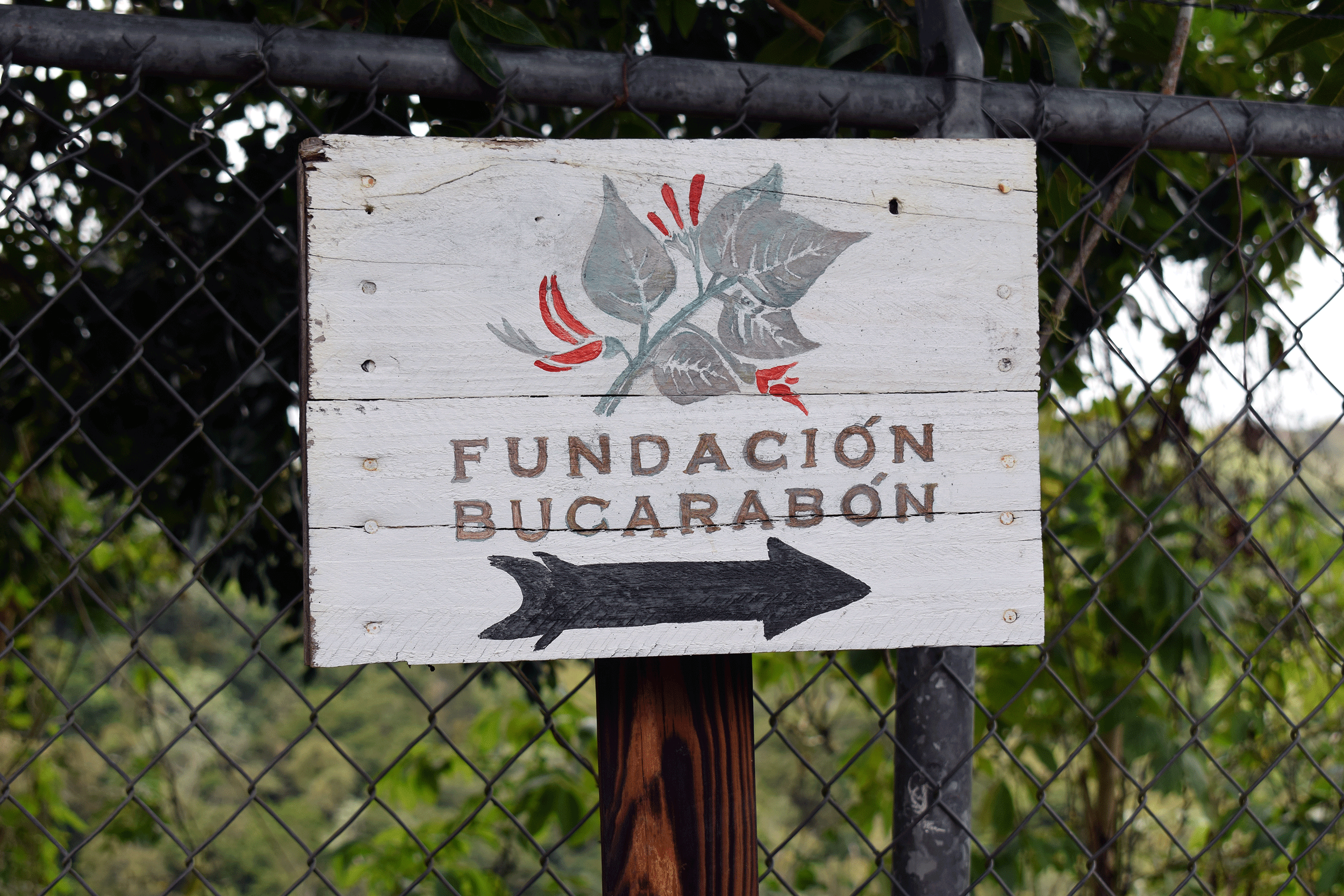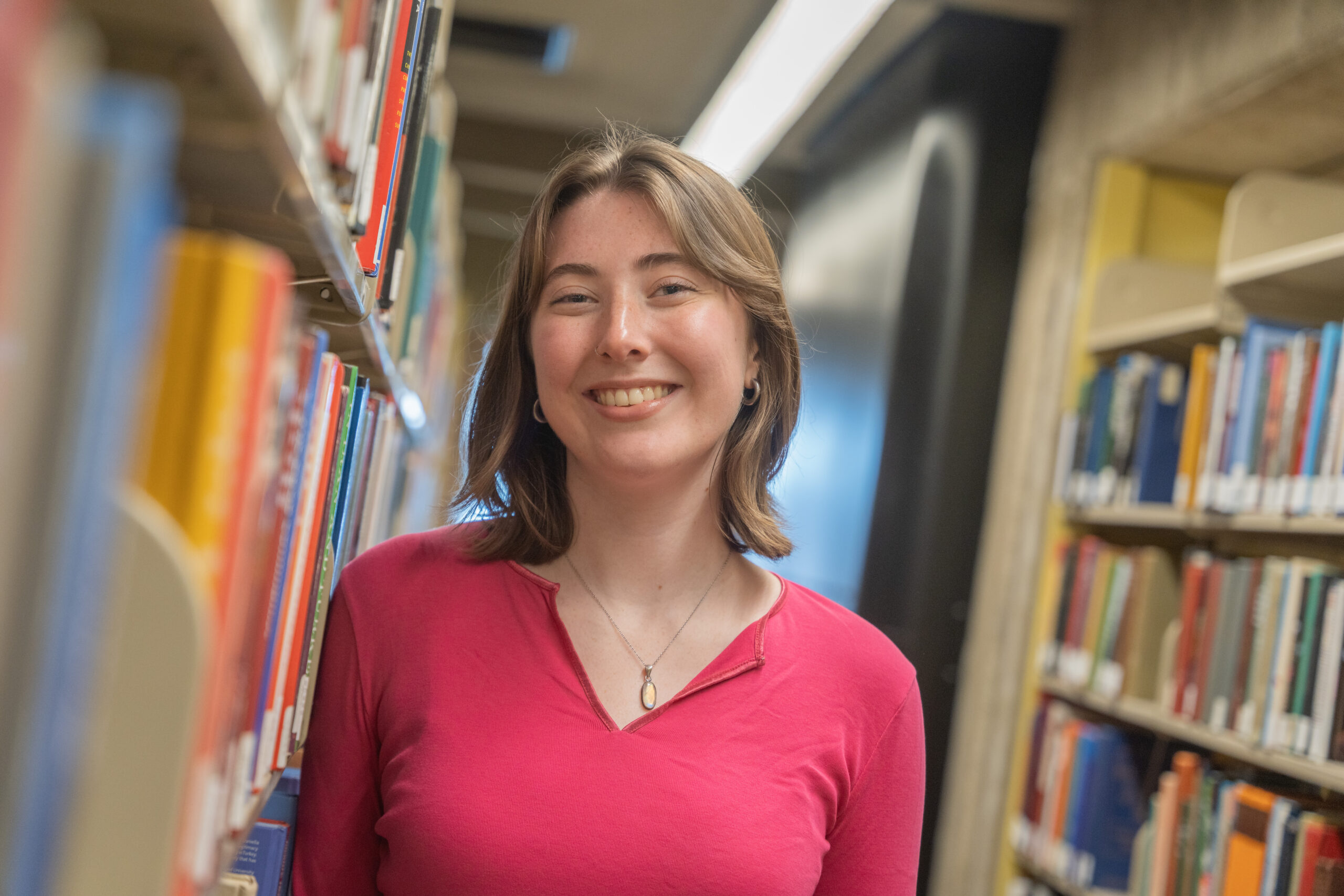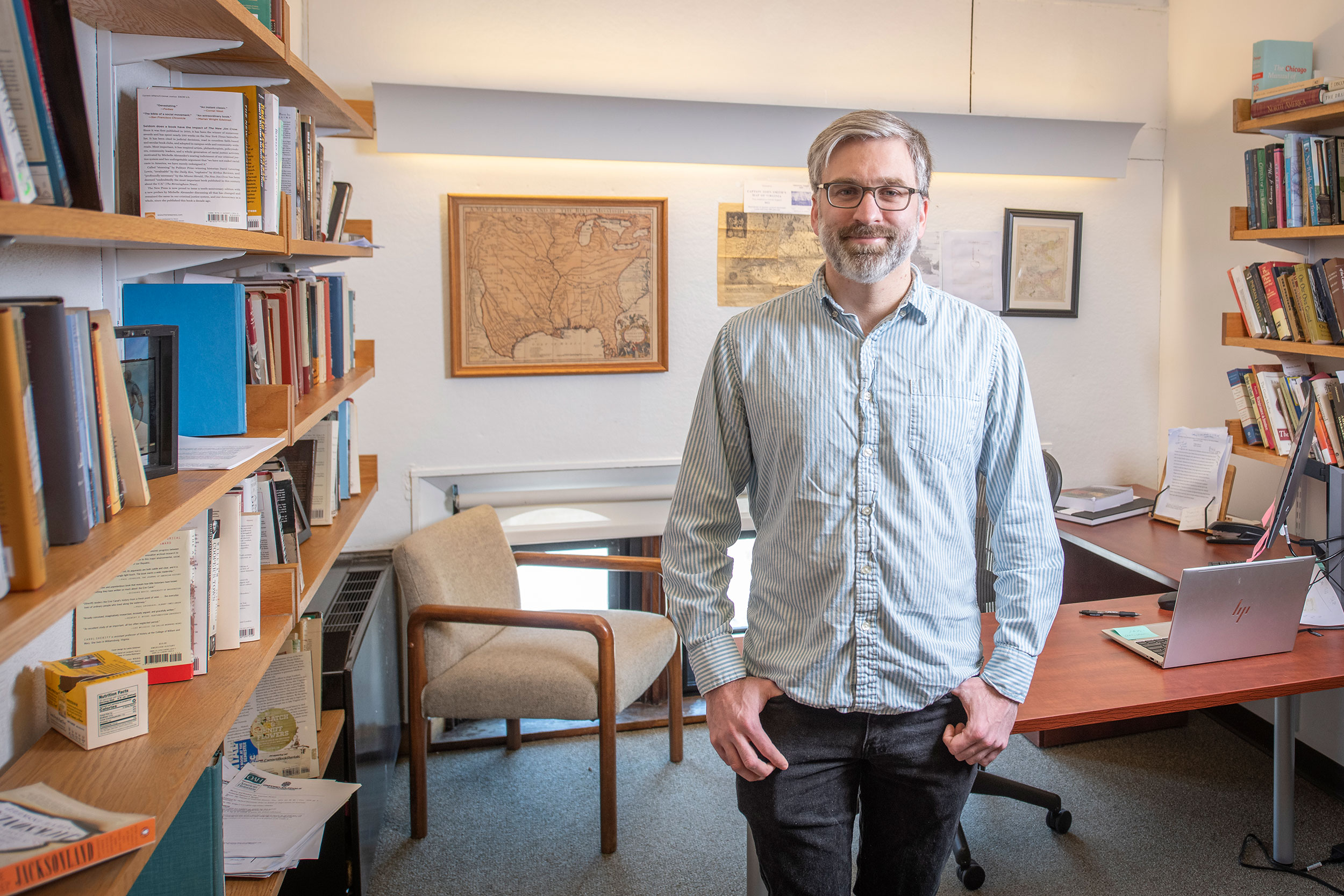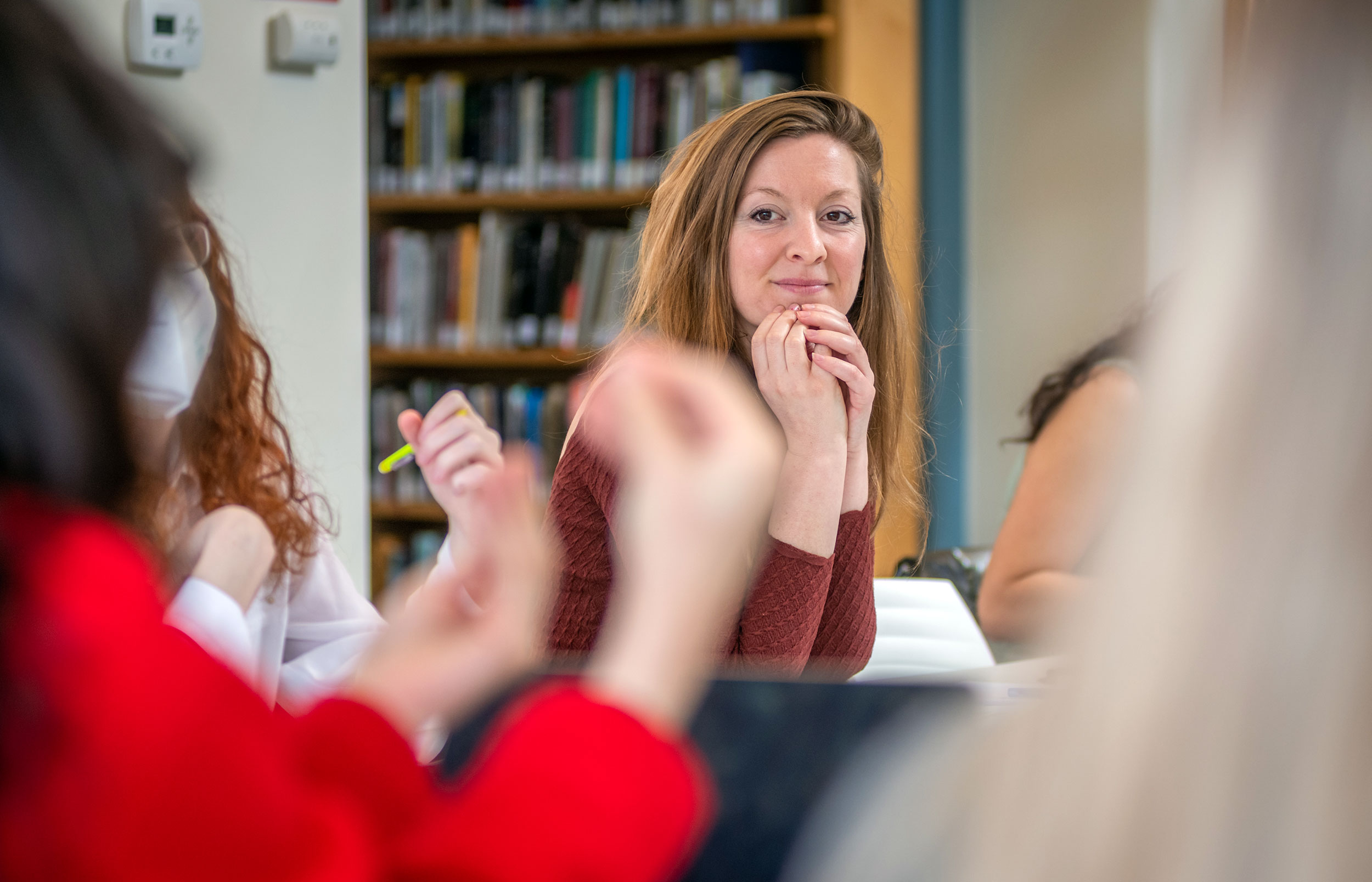Sustainability and Social Justice professor, students work with coffee community to overcome hurricanes, earthquakes
As Puerto Rico continues to rebuild after hurricanes, tropical storms, and earthquakes, a Clark University professor is tapping into his decades of economic development experience to help a coffee-growing community become more resilient against future disasters.
“Given climate change, and the increasing strength and frequency of storms, it’s incredibly important to become self-sufficient,” says Ramón Borges-Méndez, associate professor of urban planning and community development in Clark’s Department of Sustainability and Social Justice.
Professor Ramón Borges-Méndez in Puerto Rico (above). Students in his Community Development Studio class (photo at top of story) traveled there to apply what they had learned.Over 30 years, Borges-Méndez has focused his research on food systems, inequality, labor economics, migration, and globalization. The Fulbright Scholar worked at academic institutions in Chile and the United States and served as a consultant for the Ford Foundation, World Bank, Economic Commission on Latin American and the Caribbean of the United Nations, the U.N. Department for Social and Economic Affairs, and The Brookings Institution. Locally, he is chair of the board of the Worcester Common Ground Community Development Corporation, and serves on the regional board of the Conservation Law Foundation of Massachusetts.
Borges-Méndez’s heart, however, lies in Puerto Rico, where he was born and raised by his mother, “a grand egalitarian,” he says, who led employment programs at the University of Puerto Rico and the Department of Labor.
After hurricanes Irma and Maria killed and displaced thousands of Puerto Ricans in 2017, destroying buildings and roads and causing food and water shortages and widespread electrical and communications outages, Borges-Méndez returned home to assess the damage.
Then he went to work, conducting research and interviewing stakeholders in the hardest hit communities to determine what they needed to recover. In “Decolonizing Resilience,” a 2019 article in in the Journal of Extreme Events, Borges-Méndez and Cynthia Caron, his colleague in the Department of Sustainability and Social Justice, proposed an “equitable resilience-building process” to empower residents to rebuild and reconstruct the coffee-growing industry in western Puerto Rico.
Overall, the 2017 hurricanes had destroyed 80 percent of the island’s coffee trees. Stakeholders urged that any rebuilding efforts “should consider the social needs of women in the coffee region in their role as workers, farm managers, mothers, entrepreneurs, and administrators in the coffee-supply chain,” the Clark professors wrote.
In making their case, they noted Puerto Rico’s continued reliance on the United States to feed the island’s residents: More than 90 percent of Puerto Rico’s food supplies are imported from the mainland, remnants of its colonial hold on the island territory.
“Given Puerto Rico’s location in the Atlantic’s ‘hurricane belt,’ natural disasters will continue to disrupt agricultural production and its highly dependent food system,” they wrote.

Launching Fundación Bucarabón
Not long after the 2017 hurricanes, Borges-Méndez — along with his Puerto Rican colleagues Jacqueline Perez Torres and Krys Rodriguez Aviles — founded Fundación Bucarabón, a nonprofit organization supporting women, farmers, and community economic empowerment initiatives in Maricao, a town in mountainous, western Puerto Rico. Their goal was to “build back better,” ensuring residents could survive — even thrive — in the face of disaster.
Their efforts were initially stymied by a series of earthquakes, the global pandemic, and 2022’s Hurricane Fiona. Puerto Rico also has faced monumental bureaucratic challenges since the 2017 storms; the government, which has been slow to distribute resources, estimates it will take $128 billion to rebuild the island’s infrastructure by 2030.

Despite the setbacks, and with the help of grants secured by Borges-Méndez and his collaborators, Maricao’s residents are taking matters into their own hands.
In a former abandoned school, on 30 acres in Bucarabones, a nearby barrio of 164 residents, the foundation has established what it calls “a social and economic hub” for regional agricultural workers, especially women and their families. The community has refurbished a 21,000-square-foot former school building, installed solar energy and water-collection and purification systems, launched a children’s digital library, and built a kitchen incubator to train women as food-business entrepreneurs, offer workshops on food safety and security, and coffee tasting.
“We have an industrial kitchen that can process hundreds of meals a day,” Borges-Méndez says. “The kitchen training includes food preservation, food conservation, and food canning like the old-style home economics.”
The foundation’s efforts could not be accomplished without grant funding. Over the past several years, Borges-Méndez has secured support from AmeriCorps, USDA Rural Development, the Ewing Marion Kauffman Foundation, the USDA’s National Institute of Food and Agriculture’s Agriculture and Food Research Initiative, the National Association of Latino Community Asset Builders, and the JPMorgan Chase Foundation.
A $103,000 grant through the AmeriCorps VISTA program’s food security initiative has employed 25 AmeriCorps VISTA workers— all 25 of them Puerto Rican — who have worked with community members to introduce sustainable tilapia fish farming, hydroponically grown basil, mint and other herbs, and small-scale chicken and egg production. They also help manage the foundation’s social media channels to promote agricultural initiatives and attract funding.

The foundation recently launched a coffee cooperative that will buy beans from local women farmers and promote women — who traditionally have served in low-wage, subordinate positions in Puerto Rico’s coffee industry, in addition to support women coffee pickers and coffee shop owners. In a joint partnership with Para La Naturaleza, and with support from the Hispanic Federation, and the National Cooperative Business Association (CLUSA), the foundation recently reactivated Hacienda Margarita, an idle coffee processing farm.
The cooperative aims to carve out a niche in the island’s coffee market, 85 percent of which has been cornered by large roasters which largely import low-quality coffees.
“We have our own brand: Café Bucarabón,” Borges-Méndez says. “It’s single-grower, single-farm, hand-picked Arabica. It’s a high-premium, specialty coffee.”
Involving Clark students
The foundation’s work with community members in Maricao provides an ideal opportunity for graduate students in Clark’s Department of Sustainability and Social Justice to learn about — and get hands-on experience in — economic development, non-profit development, and food systems, according to Borges-Méndez.
Last spring, his Community Development Studio class divided into two teams to develop semester-long projects aimed at supporting Maricao’s agricultural workers. As part of a Global Learning Collaborative — an academic program unique to the Department of Sustainability and Social Justice — the students traveled to Puerto Rico to put their plans into action.
Meghan Kennedy ’23, M.A.’24, was part of a team that wrote a plan to promote Café Bucarabon. The students created videos and podcasts and delivered a research report on fair trade, organic, and women’s-owned certification for coffee products.
“I enjoyed that the class allowed us to build and execute a project within a semester,” Kennedy says. “It was fulfilling to assist a real nonprofit and create deliverables that could be used in the real world.”
A second team from the class contributed to the food-security initiatives. They planned a pilot project supporting 25 households that are raising chickens to provide their families with additional income and post-disaster protein sources.
“One of the most severe problems caused by natural disasters is that they strongly impact the capacity of communities to produce and generate protein,” Borges-Méndez says. “The cows die, the chickens are blown by the hurricanes, and flooding and earthquakes impact supply chains. Farmers need to bring food back into the affected communities.”
The second team also helped Borges-Méndez write a proposal for a USDA Rural Development grant to support the protein project; researched chicken farming, permits, and products and markets for surplus eggs; developed a business plan; built a chicken coop prototype for families; and created a manual to train farmers.
“The families will get six to 12 chickens and can keep all the eggs they want,” Borges-Méndez says. “But they also will have the choice to sell eggs back to the foundation, which will develop products,” including packaged, de-shelled eggs and pre-made omelets for sale.
“It’s a self-reinforcing loop that generates economic development where there was none,” he adds.
Promoting culture and building resilience
Thanks to a grant that Borges-Méndez and the foundation’s team secured from Puerto Rico’s Institute of Culture, the foundation’s newest initiative includes restoring a 1930s theater. His colleague from the Theater Department of University of Puerto Rico’s Rio Piedras campus reactivated the UPR’s traveling theater troupe that hopes to rehearse plays and train actors at the facility.
Borges-Méndez says the initiative reminds him of President Roosevelt’s Federal Theater Project under the Works Progress Administration. “We’re reviving a great tradition,” he says, “where people convey ideas through representation and theory.”
All the funding, organization, and hard work by the community over the past five years have succeeded in turning Bucarabones into a “resilience center,” Borges-Méndez says. That resilience got its first test during the earthquakes of 2019-20, just after Fundación Bucarabón was founded, and subsequently during other social emergencies.
“We tended five refugee camps. We were the lifeline for the community,” he says. “In the blink of an eye, we can get out there with tarps, tents, generators, and equipment to clean branches, trees, everything. We’re self-sufficient in energy, we’re self-sufficient in water, we’re self-sufficient in electricity, and we have the only facility in the area with underground internet lines.
“We’ve learned that there are not a lot of people looking out for these communities, which are very isolated and deep in the countryside,” Borges-Méndez adds. “The story here is that when people don’t look after you, and you don’t feel like you’re getting what you need, you have to do things for yourself.”






